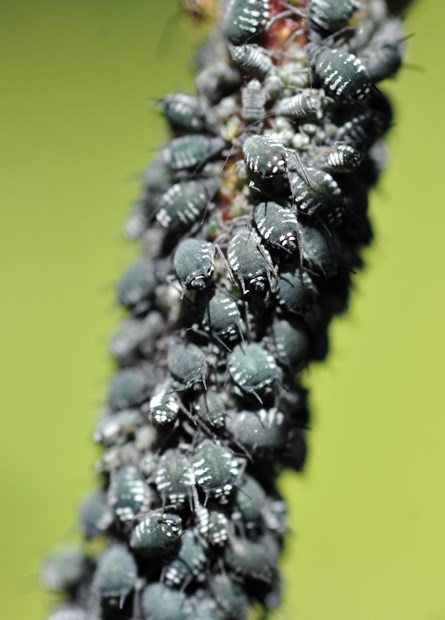Lush foliage and growing gardens invite nature's creatures to dine, and insects bad and good will visit the garden this growing season.
Perhaps the most important pest and disease management philosophies to understand are balance between predator and prey, patience for controls to work and tolerance for all life forms in the garden. But before I get too far gone on lofty ideals, here are a few safe, common sense, practical and affordable pest and disease control methods for your garden.
Tools you will need:
A one-litre water sprayer for home use - not a chemical sprayer.
A hose nozzle that has a finely adjustable nozzle.
A shop vacuum with a long, grounded extension cord.
One pair of Felco hand pruners - sorry but anything else is just not Jedi.
A metal soil probe that can penetrate at least 12 centimetres/one foot into the soil, to check soil moisture as related to pest or disease diagnosis.
A 20 times or stronger hand magnifier to accurately identify pests or diseases.
Most importantly, you will need technique and skill, not products.
For the following pest or disease problems, try one or all methods in tandem to obtain control.
Spittle bugs: Those little buggers run off at the mouth and secrete a foamy covering to protect themselves from predators. Spittles attack a number of plants, but they are often seen on overfertilized plants.
The single most effective, beneficial and cost-effective way to remove spit bugs from your plants without harming the Mother Earth is to water-wash gently with a pressure-controlled garden hose and nozzle, or use a one-litre sprayer and wash until the foam washes off and the tiny orange or green spittle bug is washed off the plant onto the ground to become food. You may have to hold the leaf and spray gently as you learn how to work the procedure. Severe damage may have to be cut off.
Aphids on anything: Water-wash carefully in a targeted manner at reduced pressure but use a sharp stream for accuracy. Most aphid colonies can be removed with a one-litre sprayer of water. Harder to reach or severe colonies may require a garden hose and controlled nozzle. Or, use a shop vacuum to remove large colonies. The shop vacuum can be modified to accommodate enhanced aphid removal, i.e. extra vacuum tubes for better reach.
For easy to reach plants, even a hand-held vacuum can remove aphids. It is important to remember that some aphids should be left in the garden to provide food for predatory insects, creating a self-sustaining cycle of predator and prey for long-term control.
Weevils: I have hunted, trapped, counted and controlled weevils and even trained students to do the same. I have come to believe that weevils are not that serious of a garden pest - in a nursery setting yes, in the backyard garden, not so much. Sixty years of the chem-kill-way has done nothing to solve the problem. Yes, weevils are around and do some damage, but often the damage is short-term with many shrubs outgrowing the weevils. Longer-term infestations require a diagnosis of the underlying growing conditions to determine what is out of balance in the garden. Sometimes watering, mulching, a reduction of chem-ferts may be all that is needed.
Ultimately, however, a crop change may be what is required.
Black spot and powdery mildew on roses: You will need to provide six hours minimum, preferably eight hours per day, of direct sunlight to grow roses. You will also need ample depth of rich soil, a bed design that provides airflow across the base of the roses and mulch on the soil. If you can not provide those specific conditions then grow something else.
Water-washing does help control powdery mildew, especially if the soil is dry, which exacerbates the condition. Spraying fungicides to control black spot is a lifetime sentence, because fungicides do not cure plant diseases, fungicides only prevent the initial infection. Otherwise replant a new, fragrant and disease-resistant rose.
One final note about rose diseases: products do not grow healthy, robust and floriferous roses, knowledge and skill does.
Those are only a few of the simple, sustainable and effective techniques to deal with pests and diseases in the garden. It should be understood that mastering a technique only requires practice and perhaps patience over time to learn it as a skill for life.
As for a cost/benefit of the chem-kill-way versus the organic control ideas I've discussed, gardening is supposed to be fun, not a hazard. Water-washing and shop vacuuming control many pests and when you weigh the cost of fuel to drive, the purchase of poison and tax, water-washing and shop vacuuming are just as effective, less expensive, safer for our children and gentler on Mother Earth.
Todd Major is a journeyman horticulturist, garden designer and builder, teacher and organic advocate. [email protected]



